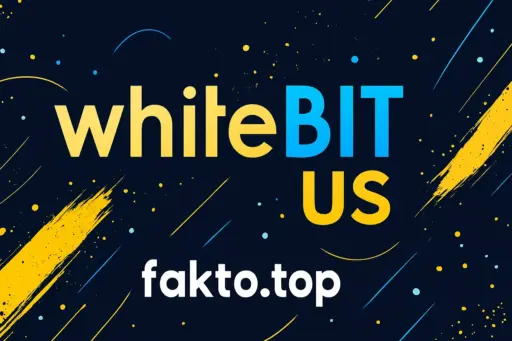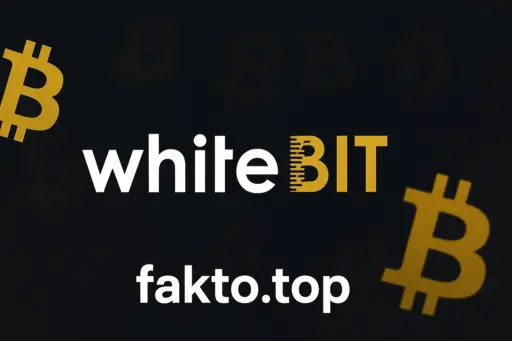WhiteBIT US: Establishing a Compliant and Secure Presence in the United States Cryptocurrency Landscape
WhiteBIT US positions itself as a regulated digital asset platform designed for a market where compliance, security, and operational transparency determine long-term relevance. The American crypto ecosystem remains one of the most tightly supervised environments in the world, requiring exchanges to meet clear standards set by both federal and state authorities.
By structuring its operations as an independent US-based entity, WhiteBIT US emphasizes adherence to local rules rather than relying on offshore regulatory arbitrage. This approach signals a deliberate strategy: to compete not with unregulated platforms but with established exchanges that meet strict oversight, institutional requirements, and custody frameworks.
With this foundation, the platform aims to function as a credible venue for traders seeking consistent regulatory guarantees.

WhiteBIT US Regulatory Status and Licensing Framework
The launch of this American entity arrives at a moment when oversight defines the competitive landscape, and WhiteBIT US approaches licensing through a structured, multi-layered regulatory architecture. The company has already completed its initial authorization steps in several jurisdictions and continues expanding through the formal state-by-state approval system.
As part of this trajectory, the platform outlines its commitment to meet supervisory conditions while scaling its operational footprint across the country. In this context, the WhiteBIT US launch and the broader initiative through which WhiteBIT enters the US market are framed not as symbolic milestones but as practical evidence of regulatory readiness.
By aligning with federal guidelines and the requirements set by state financial departments, the exchange positions itself as a legally recognized participant in the American digital assets sector.
Adherence to US Compliance Standards (KYC/AML)
Compliance expectations for digital asset businesses in the United States include sophisticated identity verification, strict anti-money-laundering controls, continuous monitoring, and the application of risk-based frameworks reflecting federal norms. WhiteBIT US builds its onboarding process around these expectations using multi-stage verification and automated identity matching systems designed to capture inconsistencies and prevent illicit activity.

The platform incorporates document checks, biometric validation, and behavioral monitoring to maintain alignment with guidelines enforced by federal agencies. Beyond initial verification, continuous surveillance ensures that transaction flows follow the thresholds and reporting rules outlined under US AML legislation. This structure allows the exchange to operate with a compliance model that matches the standards expected from financial institutions serving both retail and institutional clients.
The Importance of a New York Headquarters
Operating from New York elevates WhiteBIT US into one of the most demanding regulatory jurisdictions in the world, providing both challenges and strategic advantages. The state applies a high-intensity supervisory regime, and exchanges choosing New York as their headquarters effectively demonstrate confidence in their ability to meet requirements that go far beyond the national baseline.
By situating its core office here, WhiteBIT US gains proximity to institutional investors, compliance specialists, and legal infrastructure that supports long-term growth. The location also places the exchange within a network of financial service providers that shape the digital asset sector in the United States, allowing it to integrate with established professional standards and respond quickly to regulatory expectations.
This positioning reinforces the company’s intention to operate as a high-credibility platform.
What is the Role of FINCEN and NYDFS for WhiteBIT US?
FINCEN defines national reporting standards, registration requirements, and the operational duties that money service businesses must fulfill, while NYDFS governs one of the strictest state-level digital asset frameworks through its licensing and supervisory model.
For WhiteBIT US, the combination of these authorities creates a dual-layer compliance foundation: federal oversight ensures that the exchange maintains proper reporting, recordkeeping, and AML procedures, while New York’s regulator evaluates operational integrity, governance, and consumer protections. This structure requires the platform to maintain clear risk assessments, independent audits, and detailed operational disclosures.
Meeting both sets of requirements positions WhiteBIT US as an exchange capable of functioning across a broad set of jurisdictions while upholding rigorous controls aligned with institutional expectations.

Comprehensive Review of Spot Trading on WhiteBIT US
Spot trading on WhiteBIT US is structured around reliability, transparent execution, and a framework that emphasizes regulatory conformity. Instead of positioning itself through aggressive leverage or speculative derivatives, the platform focuses on straightforward digital asset transactions designed to meet the expectations of American users who prioritize stability and predictable mechanics.
Order execution processes are built on established models familiar to traders migrating from traditional finance, while the exchange’s architecture emphasizes latency reduction and consistent uptime. By centering its offering on spot markets, WhiteBIT US provides an environment aligned with institutional requirements, ensuring that market depth, custody safeguards, and trade reporting match the expectations of regulated financial participants.
Supported Digital Assets and Trading Pairs
The list of supported assets focuses on cryptocurrencies that meet clear regulatory expectations and carry established liquidity profiles. WhiteBIT US structures its listings around coins with transparent histories, identifiable development teams, and compliance-friendly attributes, avoiding tokens that present unresolved legal questions.
Traders gain access to major assets such as BTC, ETH, and selected stablecoins, alongside several carefully evaluated altcoins that pass internal and external due-diligence standards. The exchange maintains strict criteria concerning market integrity, custody compatibility, and operational risk before approving any new listing.
Trading pairs reflect real demand rather than speculative volume, enabling users to operate within a marketplace that prioritizes clarity over hype-driven expansion.

WhiteBIT US Fee Structure Explained: Transparency and Competitiveness
The fee model is designed around clarity and predictability, helping users understand their cost basis without hidden conditions or fluctuating tiers that complicate long-term planning. WhiteBIT US applies a maker-taker framework with rates positioned to remain competitive among regulated American exchanges. The structure avoids promotional loopholes, temporary discounts, or aggressive incentives that distort pricing.
Instead, it focuses on consistent costs suitable for high-frequency traders and long-term participants alike. Fee transparency continues through withdrawal charges, deposit policies, and network-related costs, all presented in a manner that prevents ambiguity.
This disciplined approach reinforces the exchange’s positioning as a platform built for stable, regulated participation rather than short-term marketing campaigns.
Understanding Fiat On-Ramps and Withdrawal Options
WhiteBIT US incorporates fiat pathways designed to integrate smoothly with traditional banking channels, offering users predictable mechanisms for deposits and withdrawals.
The platform collaborates with regulated payment processors that understand US compliance obligations, ensuring that transfers meet procedural standards for authentication, reporting, and security. Fiat onboarding requires verified identity, confirmed banking details, and adherence to transaction monitoring thresholds that align with domestic financial laws.
Withdrawal processes follow a similar framework, ensuring that funds move only to accounts controlled by the verified user. This system reflects a model common to established financial institutions: predictable access, detailed logs, and operational stability supported by clear regulatory expectations.
Security Protocols and User Asset Protection on WhiteBIT US
User protection operates as the cornerstone of the platform’s infrastructure, combining industry-standard security tools with compliance-driven oversight. WhiteBIT US employs segregated custody arrangements, cold-storage mechanisms, and multi-signature withdrawal procedures designed to minimize exposure to unauthorized access.
Continuous internal audits and external assessments validate the integrity of these systems, ensuring that both hardware and software safeguards remain aligned with current regulatory expectations. Beyond custodial controls, the platform integrates behavioral analytics, anomaly detection, and strict withdrawal authentication layers that prevent unauthorized activity.
This security structure aligns with American requirements for digital asset venues, providing a controlled environment for operational continuity and asset protection.
Step-by-Step Guide: How to Register and Pass KYC on WhiteBIT US
The registration process begins with account creation through verified email credentials, followed by mandatory personal data submission required for compliance with US identity standards. Users must provide government-issued documentation, proof of residence, and accurate personal information.
The platform employs automated verification tools that validate authenticity while applying additional checks if inconsistencies appear. Biometric confirmation may be requested where needed to ensure that submitted materials belong to the individual completing the process.
Once verified, users gain access to trading functions, fiat on-ramps, and asset transfers. This structured KYC pathway reflects federal expectations for financial transparency and supports broader AML monitoring obligations across the exchange.
A Look at the WhiteBIT US User Interface and Mobile App
The interface emphasizes clarity and a streamlined layout, helping users navigate core trading functions without unnecessary visual complexity. Charts, order books, and trade panels display relevant information without overload, reflecting a design philosophy aimed at both new and experienced traders.

The mobile application replicates the platform’s core functions, offering consistent performance and responsive control for executing trades or monitoring balances on the go. Security integrations remain active on all devices, with enforced authentication layers, session monitoring, and automatic logout features. This design framework ensures that the user environment remains accessible, dependable, and aligned with the operational standards expected from a regulated exchange.
Which States Can Use WhiteBIT US? Understanding Geographical Restrictions
Access to WhiteBIT US follows a phased regulatory model where availability depends on completed state-level approvals. Because digital asset exchanges must meet separate licensing obligations in each jurisdiction, the rollout prioritizes regions with streamlined authorization requirements before expanding into states with more complex regulatory processes. Users in approved states can onboard, trade, and access fiat channels, while residents of pending jurisdictions are temporarily restricted until the relevant licensing steps are finalized.
This staged approach reflects how most regulated exchanges enter the American market: by securing operational clearance state by state while maintaining transparent communication about expanding coverage. As more approvals are obtained, broader national access continues to develop.
Comparative Analysis: WhiteBIT US vs. Leading US Exchanges (Kraken, Coinbase)
WhiteBIT US positions itself within a competitive landscape defined by long-standing incumbents that have shaped the American digital asset market. Kraken emphasizes banking integrations and established custody mechanisms, while Coinbase focuses on accessibility, widespread adoption, and a consumer-oriented experience.

WhiteBIT US approaches competition by prioritizing regulatory depth from the outset, framing its operational model around compliance coherence rather than brand recognition or speculative offerings.
This creates a platform that targets users seeking transparent structures without exposure to the risk profiles associated with margin-heavy exchanges. While it does not attempt to replicate the product diversity of larger incumbents, it differentiates itself through a regulatory-first architecture designed to appeal to both conservative traders and institutions that value predictable compliance standards.
Future Roadmap: What’s Next for WhiteBIT US Expansion?
The expansion roadmap focuses on securing additional state approvals, broadening asset listings that pass regulatory screening, and strengthening institutional service capabilities. WhiteBIT US aims to integrate advanced custody partnerships, improve fiat connectivity across multiple banking corridors, and introduce enhanced reporting features that align with corporate accounting standards.
The platform also plans to extend educational resources that help users understand regulatory expectations and the mechanics of compliant crypto trading. Marketing initiatives remain tied to visibility campaigns similar to the Times Square rollout, combining brand recognition with messaging that highlights the platform’s regulated nature. As its footprint grows, WhiteBIT US intends to evolve into a complete infrastructure provider rather than a simple trading venue.
WhiteBIT US FAQ: Quick Answers for Traders
The FAQ section provides direct responses to key user concerns, focusing on compliance, safety, accessibility, and operational clarity. Each question addresses practical points relevant to onboarding, verification, trading mechanics, or asset protection.
By structuring the FAQ around long-tail queries frequently searched by US users, the platform maximizes informational value while covering narrow issues that require precise and comprehensible explanations.
Is WhiteBIT US safe for US citizens?
WhiteBIT US operates under a regulatory architecture designed to protect American users through strict compliance enforcement, custody segregation, and robust security mechanisms. Safety derives not from marketing assurances but from formal oversight applied by state regulators, federal reporting rules, and continuous operational audits.
Users interact with a platform that applies authentication layers, asset segregation, and withdrawal verification standards. These measures ensure that both custody and transactional processes remain insulated from unauthorized access while maintaining transparent documentation required by oversight bodies.
Which documents are required for WhiteBIT US verification?
Verification requires a government-issued ID, proof of residence, and accurate personal information that matches official records. The system validates submitted materials through automated tools and manual checks when inconsistencies appear.
Acceptable documents may include passports, national IDs, or driver’s licenses, while proof of residence generally requires bank statements, utility bills, or government-issued correspondence. All submissions must reflect current data and meet US identification standards to ensure compliance with KYC and AML requirements.
How long does WhiteBIT US KYC approval take?
Approval times vary depending on the volume of applications and the accuracy of submitted documents. Standard submissions pass within minutes through automated verification systems, while applications requiring additional review may take longer.
Delays typically occur when images are unclear, address documents are outdated, or personal information does not match public records. The platform prioritizes prompt processing while maintaining strict adherence to regulatory accuracy standards across all user categories.
Can users access WhiteBIT US without completing identity verification?
WhiteBIT US requires full identity verification before enabling trading, deposits, withdrawals, or fiat access. This policy aligns with federal regulations that mandate confirmed user identities for all operations involving financial transfers.
Unverified accounts cannot store assets or initiate transactions. The mandatory verification structure ensures that all activity on the platform remains compliant with US financial laws while supporting stable monitoring protocols that protect users and maintain institutional-grade oversight.
What trading options are available for new users?
New users gain access to spot markets, asset conversion tools, and standard account management functions after completing verification. The platform focuses on clear execution pathways without offering high-risk derivatives or leverage products, ensuring a stable environment suitable for both newcomers and experienced traders.
The available features include transparent order books, structured custody, and monitoring tools that help traders manage risk while operating within a regulated ecosystem that prioritizes safety and operational consistency.
What proof of residence is required for WhiteBIT US accounts?
Proof of residence must clearly display the user’s full name, current address, and an issuance date that meets US verification standards. Accepted documents include utility bills, bank statements, tax correspondence, insurance notices, or government-issued letters dated within the required timeframe. Screenshots, handwritten notes, or documents with cropped details are automatically rejected.
WhiteBIT US applies automated systems to validate formatting, cross-match user data, and confirm regional eligibility. If discrepancies appear, the application may enter manual review, where additional clarification can be requested. This strict approach ensures that the platform remains compliant with oversight expectations while maintaining a transparent onboarding structure for users across approved states.
Are corporate or institutional accounts supported on WhiteBIT US?
Institutional onboarding follows a separate workflow designed around corporate compliance standards. Businesses must provide legal entity documentation, proof of incorporation, verified ownership structures, and identification for authorized signatories. Additional materials, such as operating agreements, shareholder registers, and financial statements, may be required depending on the entity type and state regulations.
WhiteBIT US evaluates each application through enhanced due-diligence procedures to ensure alignment with federal reporting rules and industry expectations for institutional custody. This framework supports organizations seeking regulated access to digital asset markets while maintaining audit trails and governance structures consistent with US financial compliance norms.
Does WhiteBIT US support custody segregation for client assets?
The exchange separates operational funds from client holdings through structured custody layers that minimize exposure to internal or external threats. Most digital assets are stored in offline environments secured by multi-signature controls and hardware modules validated through recurring audits. Hot-wallet resources remain limited to transactional needs and protected by behavioral monitoring, access restrictions, and continuous anomaly detection.
WhiteBIT US also applies withdrawal checkpoints requiring user authentication, device validation, and risk-scoring processes designed to interrupt unauthorized movements. This custody approach aligns with regulatory expectations for safeguarding client property and demonstrates the platform’s commitment to maintaining operational transparency.
Are there restrictions on stablecoins available on WhiteBIT US?
Stablecoin availability depends on regulatory clarity, issuer transparency, and demonstrated adherence to US financial standards. WhiteBIT US evaluates each asset through a due-diligence model that examines reserve attestations, issuer governance, audit frequency, and alignment with state-by-state reporting obligations. Only stablecoins meeting strict verification criteria are approved for listing, and ongoing reviews determine whether they remain eligible.
Assets lacking consistent disclosures or facing regulatory concerns may be excluded to protect users and uphold compliance expectations. This curated approach ensures that traders interact only with stablecoins supported by verifiable operational structures rather than speculative or poorly monitored alternatives.
What happens if a user resides in a state where WhiteBIT US is not yet licensed?
Users located in states awaiting approval cannot complete account activation or access trading services until local authorization is granted. The system detects geographic eligibility during registration and prevents onboarding from restricted jurisdictions to maintain regulatory integrity. Individuals may sign up for notification updates, enabling the platform to alert them when licensing processes conclude in their region.
Once approval is secured, residents can proceed with standard identity verification and access the full suite of features. This geographic enforcement model ensures adherence to each state’s legal framework and supports a stable rollout strategy across the country.
What customer support options are available for WhiteBIT US traders?
Customer support integrates multiple channels, including structured ticketing, chat assistance, and specialized compliance help for identity verification or account-related inquiries. Response procedures prioritize accuracy over speed, ensuring that guidance aligns with regulatory obligations, security standards, and operational protocols.
Users receive updates through email notifications and secure account messaging systems that document all interactions for transparency. For complex issues, the platform may request additional verification to confirm account ownership or protect sensitive data. This support infrastructure reflects a compliance-driven approach that values precise resolution while maintaining user safety and consistent service quality.
Does WhiteBIT US offer educational materials for new traders?
The platform provides structured learning resources that explain regulatory expectations, custody mechanics, crypto fundamentals, and platform-specific workflows. These materials help users understand how compliant exchanges function and highlight best practices for asset management within a regulated ecosystem.
Educational content focuses on practical knowledge rather than speculative narratives, supporting traders who want a clear understanding of how to operate within the US crypto environment. As licensing expands and more features roll out, the educational library will grow to include advanced topics relevant to evolving regulatory standards, institutional participation, and market infrastructure.
How does WhiteBIT US handle transaction monitoring?
Transaction monitoring operates through an automated framework that evaluates behavioral patterns, transfer origins, destination addresses, and overall risk indicators defined by federal and state regulations. Every transaction is assessed in real time using scoring models that detect anomalies such as unusual withdrawal timing, rapid asset cycling, or wallet interactions associated with prior sanctions alerts. When a flagged event occurs, the system may pause execution and route the case to a compliance analyst for review.
This layered oversight ensures that trading activity remains consistent with AML expectations while protecting users from unauthorized manipulation and maintaining transparent audit trails aligned with US reporting obligations.
Are there trading limits for newly registered users?
Trading limits depend on account verification level, residency requirements, and internal risk assessments. Newly verified accounts begin with conservative thresholds to ensure that early activity aligns with typical user behavior patterns. As users maintain consistent trading habits, these limits may increase after periodic evaluations that analyze transaction history, funding behavior, and compliance indicators.
The platform avoids offering unlimited thresholds without documented user history, keeping risk controls aligned with standards expected from regulated financial institutions. This approach helps protect users and the platform by ensuring that asset movement reflects legitimate activity within the regulatory framework used by financial services across the United States.
Does WhiteBIT US support multi-device authentication?
WhiteBIT US incorporates multi-device security through authentication layers that require verification whenever a new device attempts to access an account. The system evaluates device fingerprints, IP consistency, session histories, and geolocation irregularities before granting access.
If anomalies appear during login attempts, additional verification steps such as biometric checks or email confirmation may be required. This structure prevents unauthorized access while preserving usability and ensuring that legitimate users can manage their accounts across multiple devices. By combining risk scoring with authentication protocols, the platform maintains a security posture aligned with expectations for regulated digital asset environments.
What role does continuous auditing play on WhiteBIT US?
Continuous auditing ensures that operational, financial, and security processes remain aligned with regulatory expectations. Internal review systems evaluate custody procedures, withdrawal controls, and software integrity, while third-party auditors validate compliance across broader operational categories.
These reviews examine incident logs, policy implementation, risk procedures, and governance documents to confirm that all frameworks function as intended. Findings contribute to ongoing improvements and help ensure that users operate within an environment reviewed at both technical and procedural levels. This constant oversight reinforces institutional trust and supports the platform’s long-term objective of maintaining transparent and verifiable operational practices.
How does WhiteBIT US manage communication during outages or maintenance?
Operational transparency requires that all planned maintenance, updates, or outages be communicated clearly through official channels. WhiteBIT US publishes maintenance schedules in advance, allowing traders to prepare for downtime affecting trading, deposits, or withdrawals. Unexpected interruptions trigger real-time updates through platform notifications and status pages, ensuring that users remain aware of current conditions.
These communication procedures mirror protocols used across the financial sector, providing structured expectations during service disruptions. The platform’s approach centers on timely disclosure, detailed notices, and post-event summaries when required, helping maintain trust and predictability even during technical interruptions.
Will WhiteBIT US expand its digital asset listings over time?
Listing expansion depends on ongoing regulatory clearance, asset transparency, and the platform’s internal risk parameters. Each potential listing undergoes a structured evaluation that examines legal status, market behavior, development oversight, liquidity history, and custody compatibility.
Only assets that meet both regulatory and technical criteria proceed to public trading. As the platform secures additional state approvals and strengthens institutional relationships, the listing schedule may broaden to include new cryptocurrencies that pass compliance screening. This deliberate methodology ensures that users interact with assets supported by clear governance structures and eliminates exposure to high-risk or legally ambiguous tokens.
Does WhiteBIT US plan to integrate advanced trading tools?
The platform intends to expand its toolset with features that support more sophisticated strategies while maintaining compliance. Planned enhancements include improved charting options, deeper order-book analytics, automated trade-execution logic, and institutional reporting tools.
These additions are designed to function within regulated boundaries, avoiding complex derivatives or leverage products that introduce elevated risk profiles. Development priorities focus on providing traders with professional-grade functionality without compromising regulatory alignment, ensuring that all future capabilities remain consistent with US standards for financial transparency and user protection.

